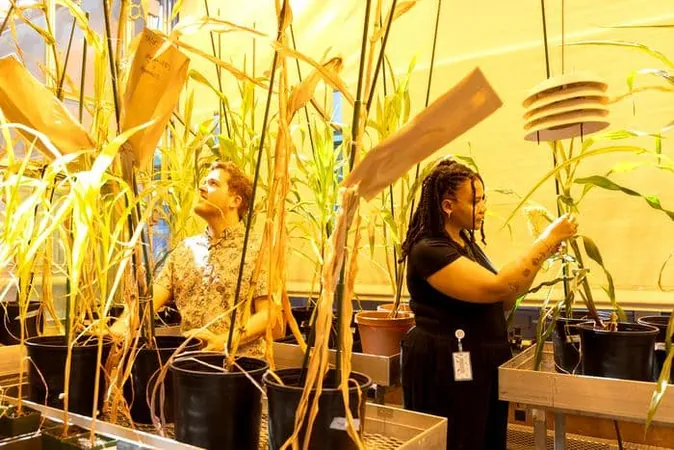
Revolutionizing Corn Farming: AI Unveils Secrets to Boost Nitrogen Efficiency
2025-05-15
Author: Wei
In a groundbreaking study, researchers from New York University are leveraging artificial intelligence to transform how we grow corn, potentially slashing fertilizer costs and mitigating environmental damage.
This innovative research focuses on enhancing corn's efficiency in utilizing nitrogen – a crucial nutrient that has driven high crop yields over the past five decades. However, an alarming 45% of nitrogen fertilizer often goes to waste, contaminating groundwater or converting into nitrous oxide, a greenhouse gas significantly more potent than carbon dioxide.
Unlocking Genetic Secrets with AI
Senior researcher Gloria Coruzzi, a prominent figure in NYU's biology and genomics fields, emphasized the importance of identifying key genes involved in nitrogen utilization. "By honing in on critical genes, we can select or even bioengineer crops to improve nitrogen use efficiency in major staples like corn,” she explained.
The study, published in The Plant Cell, details how researchers integrated plant genetics with machine learning techniques to unearth specific gene clusters, known as "regulons," that govern nitrogen use in corn.
The Economic and Environmental Upside
Corn stands as America's leading crop but struggles with its nitrogen efficiency, leading to excessive economic and ecological repercussions. By utilizing AI, the researchers trained models to identify patterns in gene responses to nitrogen in both corn and the widely studied model plant, Arabidopsis.
Their exploration illuminated the sets of nitrogen-responsive genes and their regulatory transcription factors, effectively crafting a genetic blueprint for nitrogen efficiency.
AI’s Precision in Crop Improvement
Coruzzi highlighted that traits such as nitrogen use efficiency are not dictated by just one gene but rather a set of genes working in concert. "The beauty of machine learning is its ability to discern which gene combinations are pivotal for a trait, along with the factors that regulate them,” she stated.
The researchers validated their findings through laboratory experiments, identifying two vital transcription factors in corn, ZmMYB34 and R3, along with one in Arabidopsis, AtDIV1. These discoveries significantly enhance the AI model's ability to predict nitrogen efficiency across various corn types.
A Future of Sustainable Farming
This research paves the way for accelerated crop improvement by allowing scientists to evaluate seedlings for important gene expressions ahead of traditional field tests. With effective selection for higher nitrogen efficiency, not only can farmers expect substantial cost savings, but they can also play a crucial role in diminishing nitrogen pollution and reducing harmful nitrous oxide emissions.
As we stand on the brink of a new era in agriculture, harnessing AI for genetic advancements promises not just a revolution in farming practices but also a sustainable future for our environment.


 Brasil (PT)
Brasil (PT)
 Canada (EN)
Canada (EN)
 Chile (ES)
Chile (ES)
 Česko (CS)
Česko (CS)
 대한민국 (KO)
대한민국 (KO)
 España (ES)
España (ES)
 France (FR)
France (FR)
 Hong Kong (EN)
Hong Kong (EN)
 Italia (IT)
Italia (IT)
 日本 (JA)
日本 (JA)
 Magyarország (HU)
Magyarország (HU)
 Norge (NO)
Norge (NO)
 Polska (PL)
Polska (PL)
 Schweiz (DE)
Schweiz (DE)
 Singapore (EN)
Singapore (EN)
 Sverige (SV)
Sverige (SV)
 Suomi (FI)
Suomi (FI)
 Türkiye (TR)
Türkiye (TR)
 الإمارات العربية المتحدة (AR)
الإمارات العربية المتحدة (AR)